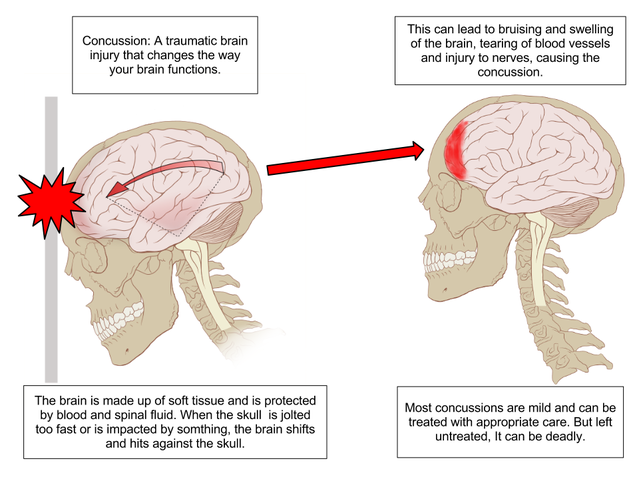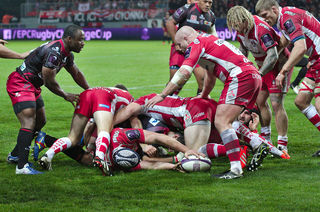Traumatic Brain Injury
A Psychologist Watches Six Nations Rugby
There is no try, there is only do or not do, except in rugby.
Posted December 19, 2018
A few years ago I decided to understand rugby. So I sat down and watched Six Nations Rugby. I am of the mind that a thing understood, is a thing enjoyed. And Six Nations Rugby has the kind of epicness about it that demands to be enjoyed.
Games like rugby have been around for thousands of years. Indeed, even the Maya were playing similar ballgames as far back as 1400 BC. So when you watch rugby, let everyone know this is a cultured game, an appreciation of humanity.
The rules of rugby were written down in 1845 at Rugby School in, you guessed it, Rugby. That's around the corner from me, which is another reason to find some deep appreciation in this game. You can also let people know that Rugby School had Lewis Carrol, author of Alice in Wonderland, as an alumni. So the game is practically literature.

Rugby is a game of debilitating persistence. It is as if a company of soldiers was battling to the take the last machine gun on a beach in Normandy under heavy fire of rubber bullets. It is a relentless siege of ordered mayhem, with frequent turnovers, occasional breakaways, excruciating tries, and mad dashes for out of control balls. Success in the midst of this mayhem is Brobdingnagian. Seriously. There is no other word for rugby success than that which applies to the land of giants in Jonathan Swift. Brobdingnagian.
It is in this land of giants that we learn the rules of life.
A lot like life, rugby has no pads. So you get hurt sometimes. I've looked for some hard evidence that this makes the game more or less dangerous than American football. In American football, the players dress up in pretend space suits designed to protect them from bone-snapping collisions. But the evidence is mixed. There were 89 tackles per game in the 2014 NFL season compared with about 200 tackles per game in professional rugby. But they are different kinds of tackles and many claim rugby tackles are safer because players don't tackle with their heads as they do in the NFL (see them putting their heads down just before they hit*).
Some statistics claim rugby is more dangerous. Some claim it's less dangerous. Most claim the statistics are nonsense due to under-reporting. Under-reporting differs by game but it benefits them both from the purging acrimony of upset mothers. The reality is that the statistics just aren't very good. While plenty of rugby players retire healthy, there are many who don't. It's safer to read a book, of course. But that's not rugby.
Suffice it to say that people get hurt. There are plenty of cuts and scratches. But all things considered, I spent a few hours in my garden the other day, clearing out the brambles, and I looked a lot worse than most rugby players.
The real danger for both sports is concussions. Concussions happen when the brain impacts with the inside of the skull. A bloody nose is easy to see, but it's basically harmless. A bruised brain can go unnoticed and it's not harmless. It has symptoms such as light-headedness, dizziness, loss of memory, and infrequently death. But there are few reported deaths from concussions in rugby or the NFL. More common are retirements from players suspected of suffering a lifetime of playing rugby crash-test dummy.

Recent research by Doug King finds that in amateur rugby leagues, players experience around 560 impacts a season, with the average G-force around 20 Gs. A car accident at 65 km per hour (40 miles per hour) is about 35 Gs. So a rugby tackle is a bit like a fender bender.
People can survive hundreds of Gs in an instant in a high-speed car accident. (If you're interested in the limits of human race car driving read this here). The evidence reported by King suggests that most concussions happen between 70 and 110 Gs. Rugby and the NFL are like running into every car in the supermarket parking lot and hoping you don't have that one accident where the G's getcha.
The real problem may not be any individual concussion, but repeated concussions. It's a bit like stubbing your toe. Stubbing your toe once or twice may not be so bad. If you stub your toe over and over again for years, you're eventually going to walk funny. Jonathan Thomas' retirement in 2015 with mild epilepsy and memory loss is one high profile example.
Also a lot like life, to go forward in rugby, you must sometimes go back. In rugby, the ball can only be thrown backward, which means that you can't pass upfield. A team always gives away ground to move the ball between players. You can kick the ball upfield, you just can't throw it upfield.
Still like life, when things are grim, punt. In Rugby and the NFL, you can always kick. But because of the ball's ovoid shape, there is a huge degree of uncertainty about where it will go when it hits the ground. In the NFL a kick is a set play, so everybody knows its happening. In rugby, a kick can often come from the guy running the ball about to score, who knows he can run faster if he just kicks the darn thing. This always leads to a mad dash and often miraculous turnovers.
Yoda obviously didn't watch rugby. In rugby, there is no do or do not do, there are only tries. A 'try' is rugby for touchdown. In American football, you don't have to actually touch the ball down in the end zone to make a touchdown. In Rugby you do, but they don't call it a touchdown, they call it a 'try', even though it's actually a success.
In rugby, you cannot block. To move the ball forward you really have to run like hell into the opponent's defensive line and hope for the best. This is like a huge game of Red Rover where one guy tries to bust through the chain created by the other team.
Breaking through the chain rarely works in rugby, so this means you need to pass backward because, remember, you can't throw it forwards. But that often loses ground faster than it gains it, so eventually someone kicks the ball downfield to get it going in the right direction. This explains essentially all British politics.
Rugby tackles are handled in a civilized fashion but nothing stops the game. The tackled player must release the ball and the tackling player must release the tackled player, then both sides get to scramble for the ball in what is called a ruck.

Rucks look a lot like a bunch of guys clambering for the car keys to the community Ferrari. We don't have a community Ferrari in my village, but if we did, the fight for the keys would look like this.
But this chaos has rules. A ruck can only be entered from behind one's
own teammates, so players are continually crashing into one another over top of the ball. (Recall the concussion statistics.)
In rugby, as long as the player holding the ball is still standing, a great mob of players can gang together in what is called a maul to move the ball forward in one shoving mass. Mauls are chaotic and lead to great tests of the human body to withstand the crushing power of two 15 man teams all pushing into the center of a moving circle of flesh. Eventually, a ball or a head pops out somewhere and the surviving players resume play.
Evil is punished. In case of a penalty, players can kick for a field goal. But not always. Sometimes when referees and players agree, the ball can come back into play in a scrum. A scrum is where all the players form a human knot and the ball gets thrown underneath them. These have their own set of curious rules designed to keep people's spines inside their bodies and they eventually lead to the ball popping out into the hands of the guy who threw it under the scrum in the first place.
Rugby is surprisingly civilized, which is hard to know until you really sit down and pay attention. My experience with Six Nations Rugby was a lesson in what it means to look deeper into something. And there is still much further to look.
But along the way, it's run, throw backwards, run, throw backwards, tackle, ruck, run, tackle, ruck, run tackle, ruck, run, maul, scrum, kick, madness, tackle, run, try! Glorious.
Perhaps it is the beauty of rugby that if we look closely enough, we see some curious version of our own world caricatured in its muddy light.
But then again, who cares.
*The movie Concussion tells the story well enough.




